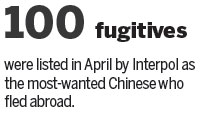Prosecutors target money laundering
The Supreme People's Procuratorate urged prosecutors across China to join the effort to fight money laundering that relies on offshore companies and underground banks, two important channels through which corrupt officials transfer large amounts of illegally obtained assets overseas.
The campaign started in mid-April and will last until the end of the year, according to a notice issued in April by the Supreme People's Court, the Supreme People's Procuratorate and three central government departments, including the Ministry of Public Security and the People's Bank of China.
Key targets of the campaign include illegal activities such as helping others make cross-border payments, conducting illegal transactions through underground banks and transferring illegal gains from bribery and embezzlement through offshore companies, the notice said.
In a statement on Friday, the top procuratorate urged prosecuting agencies all over China to improve information exchanges and coordination and use every possible means to block the illegal transfer channels. Prosecuting agencies should issue international arrest warrants promptly to request judicial assistance from other countries, it said.

"The move is primarily targeted at corrupt officials and is part of the Sky Net operation," said Huang Feng, a law professor at Beijing Normal University. "A number of cases recently have shown that underground banks and offshore companies have become major channels for corrupt officials to transfer their illegal assets."
The Sky Net operation, started in April, targets fugitives in foreign countries who are suspected of corruption. The aim is to repatriate the suspects for trial in China and recover their illegal money and assets overseas.
In April, Interpol published a list of the 100 most-wanted Chinese fugitives who fled abroad, with the fugitives' photos, names, ID numbers and possible locations. Most of the fugitives are believed to be in the United States or Canada. Most of them are officials accused of embezzlement, abuse of power or bribery, said Fu Kui, director for international cooperation at the Central Commission for Discipline Inspection.
Li Huabo, a former financial official from Jiangxi and one of the 100 fugitives on the list, who was accused of embezzling $16.1 million, was sent back to China from Singapore earlier this month.
Li fled China in January 2011 but was caught by Singapore police two months later at a casino. He was sentenced to 15 months in prison by a Singapore court last year for "dishonestly accepting stolen property". He was found to have transferred some of his assets to Singapore through underground banks, according to media reports.
To repatriate suspects and recover their illegal assets overseas, Chinese authorities must present evidence to foreign judicial authorities, which is a major obstacle to successful repatriation and recovery, Huang said.
wangxiaodong@chinadaily.com.cn
(China Daily 05/16/2015 page4)


















